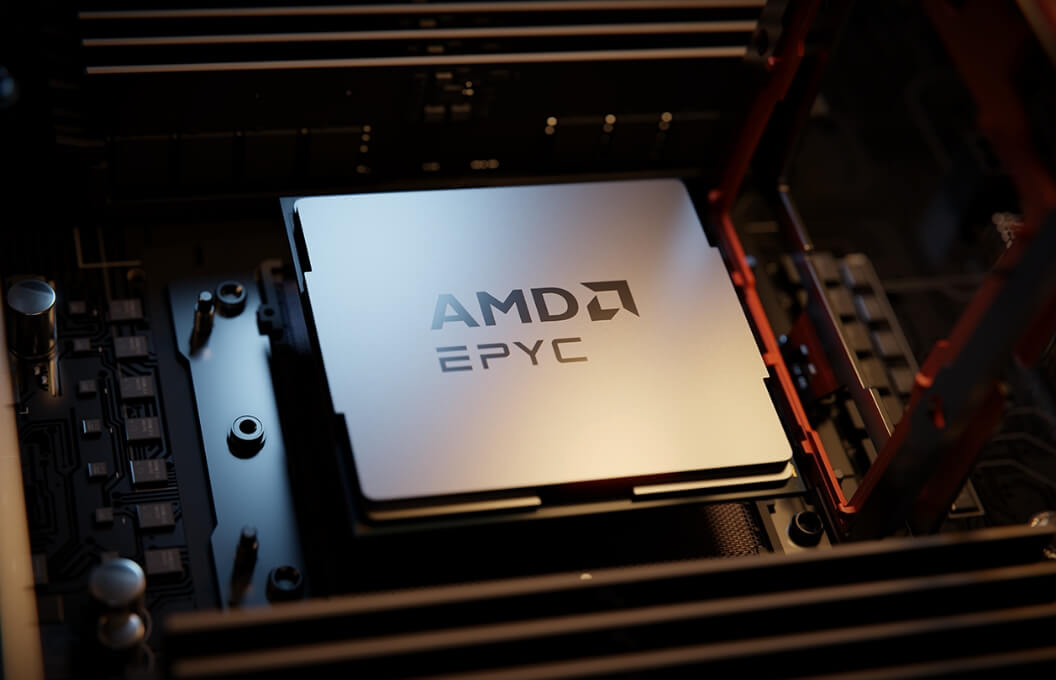Nothing Stacks Up
To EPYC™
Performance leadership that helps you thrive in the most demanding business environments of today.
AMD EPYC™ processors set a new standard for data centers – delivering continued performance leaps and opening a new world of possibilities for enterprises worldwide. Modernize efficiently and advance data center sustainability goals, while addressing today’s business vulnerabilities.
Unmatched efficiency
Revolutionary multi-die design delivers industry-leading innovation for your business
Architecture leadership
AMD Infinity Architecture offers breakthrough performance to deliver next-generation computing.
Advanced security
AMD Infinity Guard helps organizations decrease risks to their most important assets
The World’s Best Data Center CPU
Our latest AMD EPYC™ 8004 series processors bring the “Zen 4c” core into a purpose-built CPU to elevate your data center performance and efficiency – meeting the needs of space and power-constrained infrastructure.
300+ World Records and Still Counting
AMD EPYC™ processors power the highest-performing x86 servers for the modern data center with World Record performance across major industry benchmarks.

world records across
major benchmarks in
HPC workloads

world records
for HPC apps*

partnerships
with major OEMs,
ISVs and IHVs
*AMD EPYC Family of Processors as of May 2022. See amd.com/worldrecords for the full list.
Leadership Generative AI Accelerators and Data Center APUs
Uniquely designed to power even the most demanding AI and HPC workloads, AMD Instinct™ MI300 Series accelerators offer exceptional compute performance, large memory density, high bandwidth memory, and support for specialized data formats.
Raw Acceleration Power for AI and HPC
Discover how AMD Instinct™ MI300 Series accelerators can tackle your greatest computing opportunities and help take AI and HPC to the next level.

OF BUSINESS OWNERS anticipate AI will improve customer relationships and increase productivity.¹
Unlock The True Sustainability Potential of Your Data Center
With the AMD EPYC™ Server Virtualization and Greenhouse Gas Emissions TCO Estimation Tool, you can easily see the potential value AMD EPYC™ processors may deliver for your data center. You can also compare your current x86 based server solution to a solution powered by AMD EPYC™ processors!

Delivering Leadership Performance Across Key Computing Workloads
Enterprise
Create a more agile data center with AMD EPYC™ processors that support workloads with the right balance of resources and a flexible architecture that can adapt to specialized workload needs
HPC
Easily optimize IT infrastructure for the right balance of per-core and overall server performance with the balanced architecture of AMD EPYC™ processors, without compromising on key processor features
Verticals
High performance cores, large memory, and fast I/O to support workloads across a wide range of industries including automotive, financial services, healthcare, manufacturing, oil and gas, retail, and telco
Discover how you can elevate business productivity
with AMD EPYC™ processors
Footnote
-
- Forbes Advisor, “How Businesses Are Using Artificial Intelligence In 2023,” April 24, 2023
